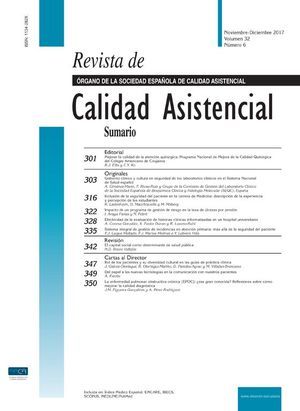La neumonía COVID-19 es una manifestación de la infección por SARS-CoV-2, y en la mayoría de casos supone ingreso hospitalario. Existen recomendaciones según las cuales se puede dar de alta a estos pacientes sin precisar ingreso hospitalario, pero no hay evidencia con relación a la revisita y el tipo de seguimiento más adecuado. El objetivo del estudio RESALSEVID fue investigar las variables asociadas a la revisita a los 30 días (Rev30d) en un grupo de pacientes dados de alta directamente en 4 servicios de urgencias hospitalarios (SUH) con neumonía COVID-19, y analizar si existieron diferencias en función de 4 dispositivos de seguimiento diferentes.
MétodoAnálisis de una cohorte prospectiva de pacientes dados de alta directamente desde urgencias con neumonía COVID-19 en 4 SUH con diferentes modelos de seguimiento al alta (atención primaria, hospitalización a domicilio [HaD] telefónico y presencial, HaD telefónico y telefónico hospitalario).
ResultadosSe incluyeron 520 pacientes, con una media de edad de 50,1 años y el 51% varones. La Rev30d fue del 18,3%, y se relacionó únicamente con la inmunosupresión, odds ratio: 4,49; intervalo de confianza del 95%: 1,10-18,24; p=0,022. No hubo ninguna diferencia en la Rev30d en función del modelo de seguimiento utilizado al alta de urgencias.
ConclusionesExisten una serie de recomendaciones que permiten dar de alta de manera segura a pacientes con neumonía COVID-19, no existiendo diferencias en la Rev30d en función del tipo de seguimiento.
COVID-19 pneumonia is a manifestation of SARS-CoV-2 infection and in most cases involves hospital admission. There are recommendations according to which these patients can be discharged without hospital admission, but there is no evidence regarding the revisit and the most appropriate type of follow-up. The objective of the RESALSEVID study was to investigate the variables associated with the 30-day revisit (Rev30d) in a group of patients discharged directly from 4 emergency departments (ED) with COVID-19 pneumonia, and analyze whether there were differences based on 4 different tracking devices.
MethodAnalysis of a prospective cohort of patients discharged directly from the ED with COVID-19 pneumonia in 4 hospital with different models of follow-up at discharge (primary care, hospitalization at home [HaH] phone and in person, HaH phone, hospital phone).
ResultsFive hundred twenty patients were included, with a mean age of 50.1 years and 51% men. Rev30d was 18.3% and was related only to immunosuppression, odds ratio 4.49 (95% confidence interval 1.10−18.24); p=0.022. There was no difference in Rev30d based on the follow-up model used at discharge from the ED.
ConclusionsThere are some recommendations that allow the safe discharge of patients with COVID-19 pneumonia, with no differences in Rev30d depending on the type of follow-up.








